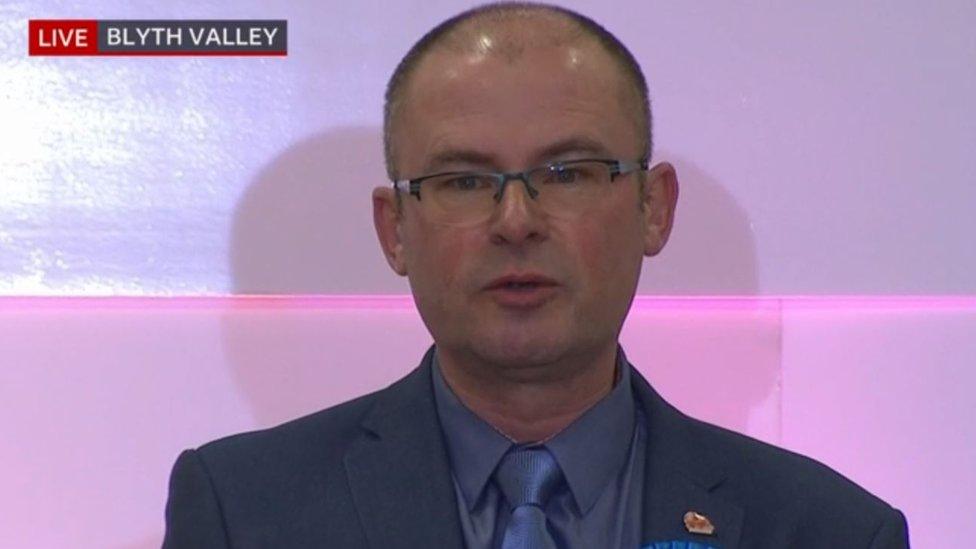Blyth Valley: A year after the first red brick turned blue
- Published
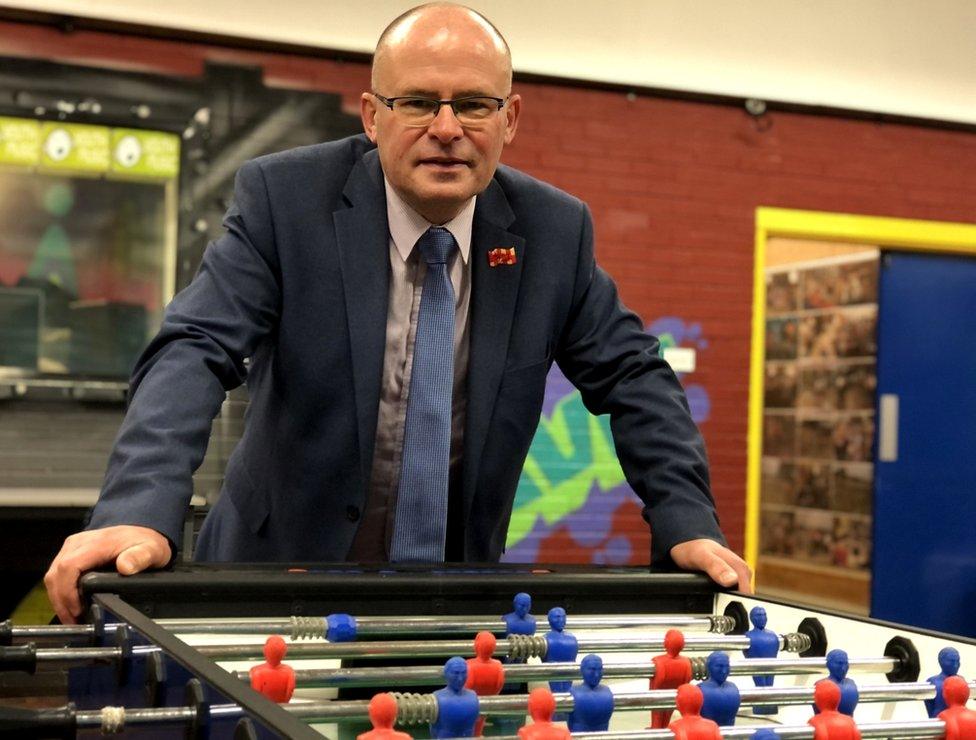
Ian Levy was elected Blyth Valley's first Conservative MP in the 2019 General Election, leaving Labour in second place
A year ago Blyth Valley made election history when it became the first brick to turn blue after being chiselled out of Labour's so-called red wall. So how does the constituency - and its MP - feel a year on?
The former mining heartland in Northumberland had just elected its first Tory MP - since the seat was created in 1950 it had always been in Labour's hands.
Similar versions of the scene were repeated throughout the night but Blyth Valley was the first place to send out the shockwaves of change.
Ian Levy, a political newbie, took to the stand, thanked his new constituents and family, and paused.
"And I would like to thank Boris," he smiled. A crowd cheered.
"You win the seat and there is a certain amount of shock to be the first Conservative MP for Blyth Valley," said Mr Levy, a year later. "So you kind of take that on board and nobody could have predicted the fact that we would have to deal with Covid.
"It's been a steep learning curve, shall I say, but an enjoyable one and one that I would certainly do again."
Mr Levy stood for election in 2017, coming second to Labour stalwart Ronnie Campbell, although increasing his party's share of the vote.
Like the constituency, he had backed Brexit, and called for better local investment.
Social media threats
The pandemic has taken over much of his first year, being part of a government tackling the nation's health and economy.
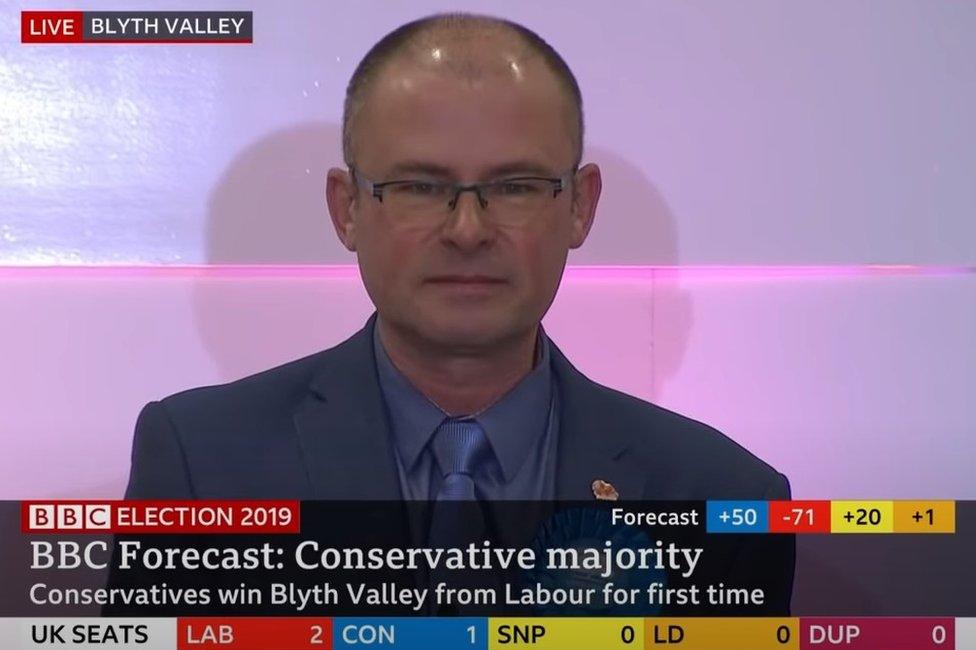
Ian Levy won the seat by 712 votes and was the first Conservative victory of the night
"I do feel that yes, we have got it right and I also feel these have been very hard, difficult decisions for any government to make, no matter which side of the house you are on," he said, while on a visit to Cramlington Voluntary Youth Project.
The area, like the rest of the North East, is currently in tier three of the government's coronavirus restrictions.
"We don't want to shut business down, we don't want to shut restaurants down, we are doing this to keep people safe and to make sure, going into 2021, that there are businesses still there," he added.
When he voted with the government against giving free school meals during the holidays, Mr Levy, like several colleagues, received threats on social media. Northumbria Police said no arrests had been made but two men were spoken to and "given advice on the Malicious Communications Act".
"There were all these demonstrations done and the threats against myself and my family that were awful, absolutely awful," the MP said.
"I think instead of people talking to me and asking me why I took that decision to vote the way I did, they jump on social media.
"Maybe I was a little naive, to be honest with you, because the reason I got into this was to make people's lives better in Blyth Valley. It is a very steep learning curve to do this job and you have got to be tough."
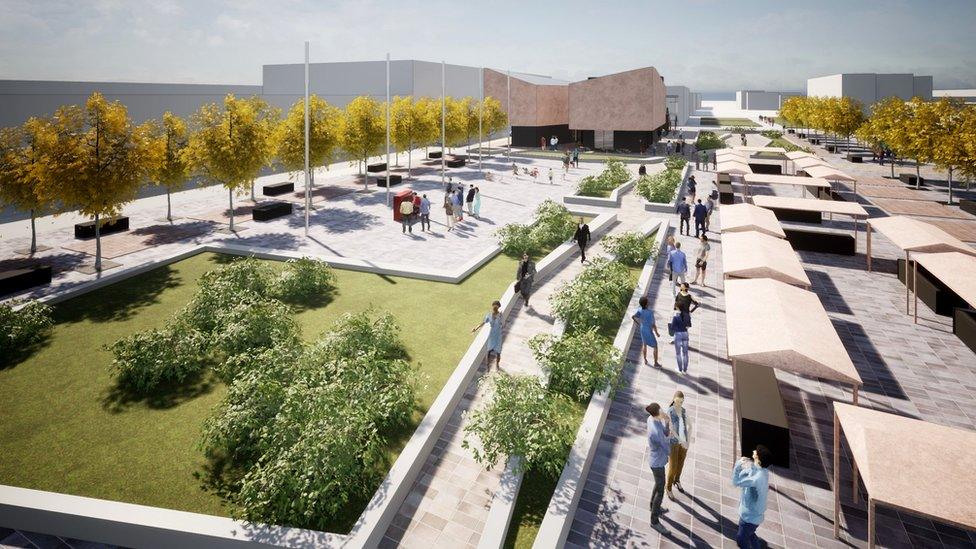
Plans for the major transformation of Blyth market place have yet to receive government funding
The area has been shortlisted for millions of pounds in government funding to improve Blyth market place and, with many people reliant on buses, there are hopes passenger services will be reintroduced on the Northumberland Line between Ashington and Newcastle, with a railway station on the outskirts of the town.
Mr Levy said he was "very confident" he would be able to deliver.
"I have to make sure that I go down to London, I knock on the door and I say I want that money for Blyth Valley, let's get it up here," he said.
On Friday, the Prime Minister Boris Johnson visited Northumberland after the former Blyth Power Station was announced as the site of the UK's first "gigaplant" to manufacture electric car batteries. It was said 3,000 jobs would be created there.

Analysis by Richard Moss, Political Editor, BBC North East and Cumbria
If the Prime Minister's promise to "level up" - a drive to improve economic prospects and lives in struggling communities - is to mean anything, it has to deliver for constituencies like Blyth Valley.
This pandemic year has made that challenge both more urgent, and more difficult. Blyth's town centre is struggling; the area needs more jobs.
The prospect of a new electric battery plant nearby could be a godsend but it remains just a prospect for now.
The fact Boris Johnson chose to visit Blyth to mark the first anniversary of his election victory is perhaps an early acknowledgement that the Conservatives will have a fight to keep this seat.
Mr Johnson though came with very little new to offer in terms of investment. Instead there were more promises of announcements to come.
And although many of Blyth Valley's voters do seem prepared to give him and their Tory MP more time to deliver, rhetoric will need to become reality if Ian Levy's election-defining victory of 2019 is to be repeated in 2024.

In Blyth town centre, just a short walk from the harbour and overlooked by a wind turbine, there are hopes of renewed economic waves for the year ahead.
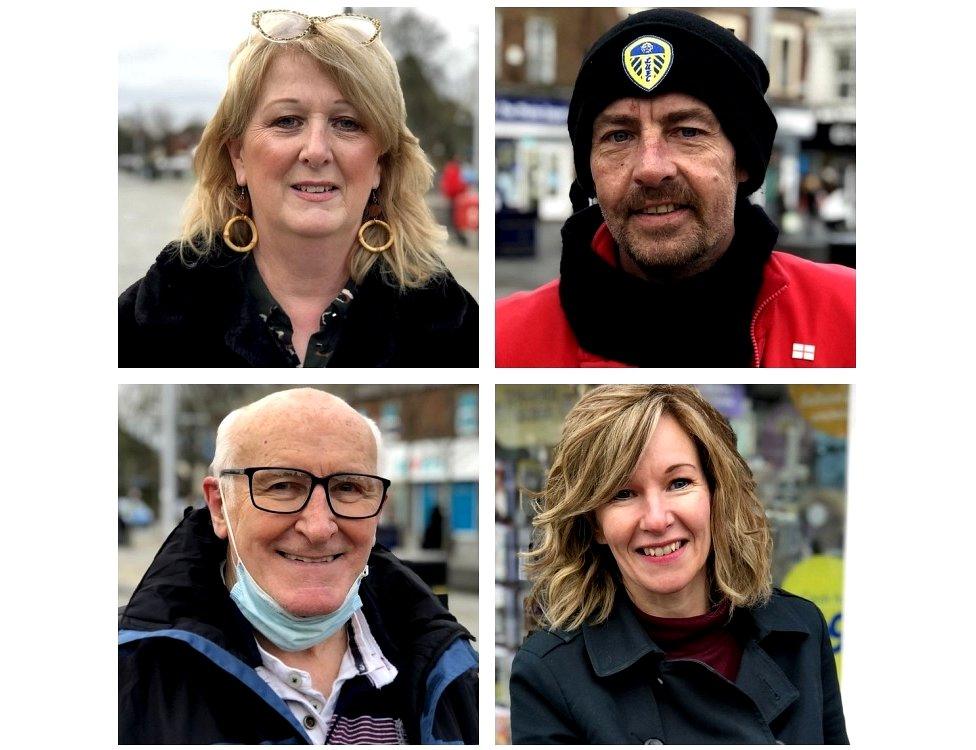
Voters Lorraine Collins, Jason Mancer, Dave Brown and Joanne Reay give their opinion in Blyth town centre (From top left to bottom right)
Born and bred in Blyth, 60-year-old Lorraine Collins voted Conservative for the first time in December 2019.
"I'm quite happy, actually, I think we could have done with a change in Blyth," she said, while shopping.
"I think it's been a year where there has been a lot happening, out of our hands, so hopefully the future might bring a little bit more."
However she thought voters may switch, and added: "I think maybe four or five years is not enough to turn it around, maybe we need a bit longer time, a bit more investment."
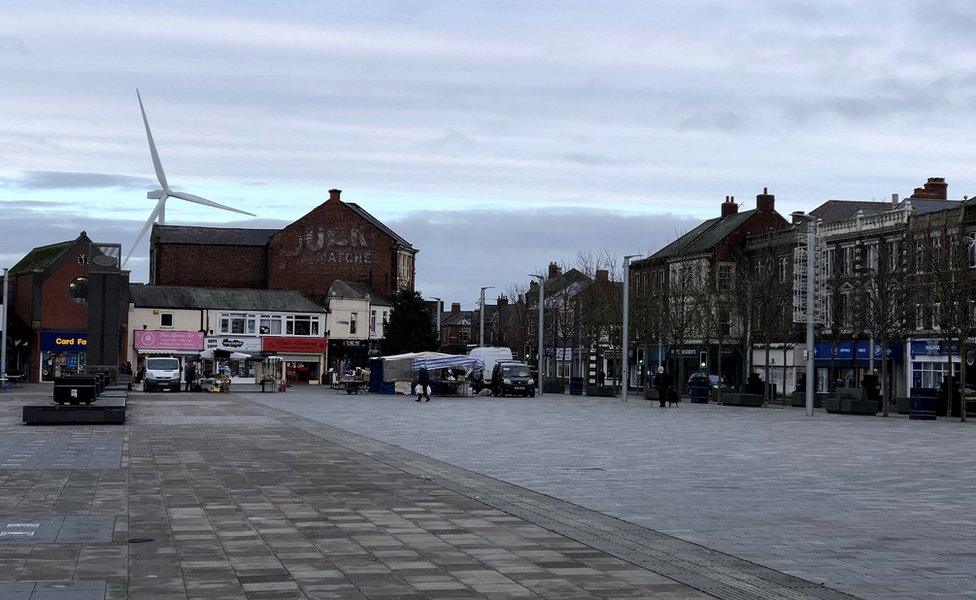
Blyth's market place could secure major investment as part of the Future High Streets Fund
Retail manager Joanne Reay said she did not vote last year because she was away, although she was not surprised the seat turned blue.
"A change is always good," she said.
"There are good things, supposedly the railways, and they are going to do something with the market place... but I think this year it is difficult to say because everything is on hold.
"Traditionally it has been very much a Labour town but I think there are a lot more professional people and families coming in that need a little bit more. We'll give them a chance."
Postman Jason Mancer was having a socially-distanced chat with former colleague, Dave Brown.
"It's taken a long time now, the people of Blyth are seeing that Labour doesn't represent them any more. That is why there was the cataclysmic change last December," he said.
"Whether or not it all comes to fruition, we can hope and hopefully Boris Johnson will reward the people of Blyth by giving Ian Levy the money that was promised. We'll wait and see."
Could Labour bounce back? "I think so aye, if they put themselves out," said 70-year-old Mr Brown.
"I'm a Labour man, through and through, like Blackpool rock," he said, smiling. "We'll see what Brexit brings, if we leave.
"Labour has another four years to make a difference, to try and win the seat back, so let's see what we are doing in four years' time. At the end of the day you have to do what the voters want."
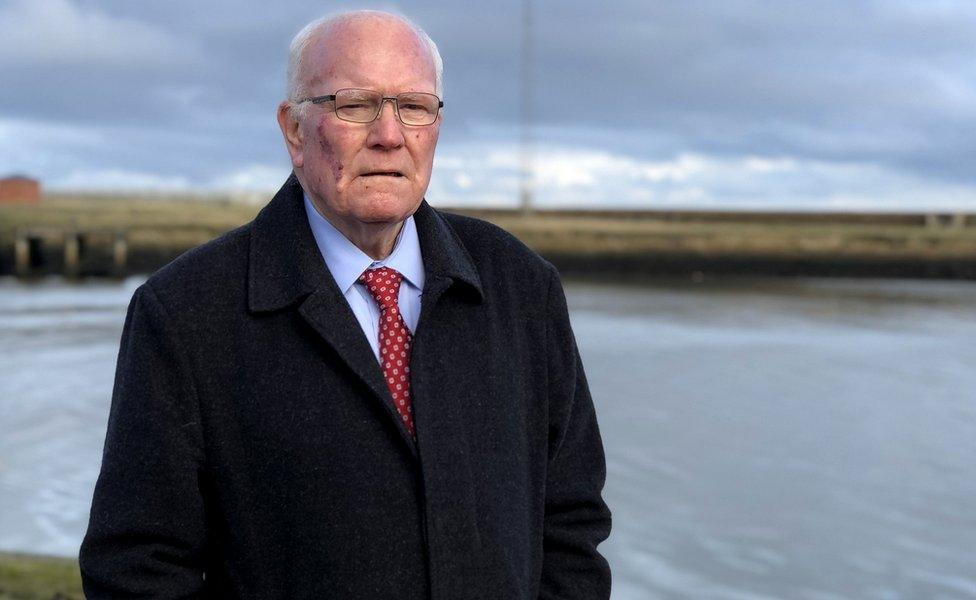
Blyth Valley's former Labour MP, the ex-miner Ronnie Campbell, believes the seat will turn red again
For Labour veteran and former miner Ronnie Campbell, it was not listening to the voters that lost Labour his old seat.
"Europe, without a shadow of a doubt, Europe," he said.
"When I met some of the old miners who I worked with down the pit they said they didn't vote Labour, they voted Tory and I was shocked.
"I said 'it was the Tories who put you out of a job', but they said 'no, Labour let us down, they didn't listen to us'. I knew that, I knew that before the election."
Mr Campbell, who also backed Brexit, stepped down after 32 years ahead of the election, which saw his 8,000 majority disappear. Mr Levy secured victory over Mr Campbell's successor as Labour candidate by just 712 votes.
"I was shocked because I didn't expect to lose it," he said, reflecting a year on.
"When you have a referendum in this country, take notice of it - that's the people speaking and if you never take any notice of people, the people won't take any notice of you."
Mr Campbell, who has been shielding during the coronavirus pandemic after undergoing heart surgery, laughed when asked what he made of his replacement on the backbenches.
"He might be a nice enough lad but obviously he has got a job on his hands," he said.
"I'm not going to say good luck to him because I think in all honesty we will win the seat back if we get Europe sorted out and that settled, I think those votes will come back."

Follow BBC North East & Cumbria on Twitter, external, Facebook, external and Instagram, external. Send your story ideas to northeastandcumbria@bbc.co.uk, external.
- Published11 December 2020
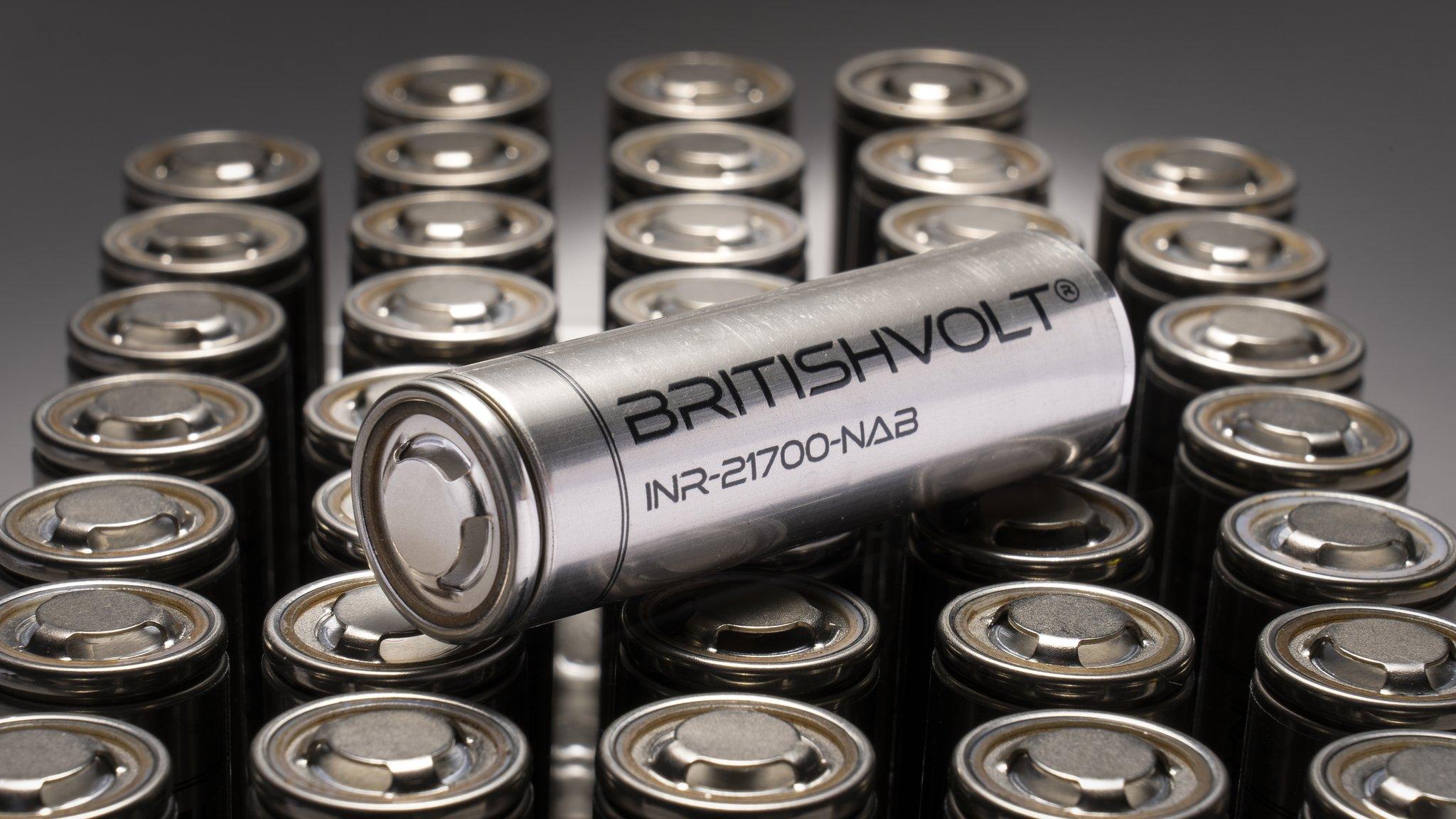
- Published28 October 2020
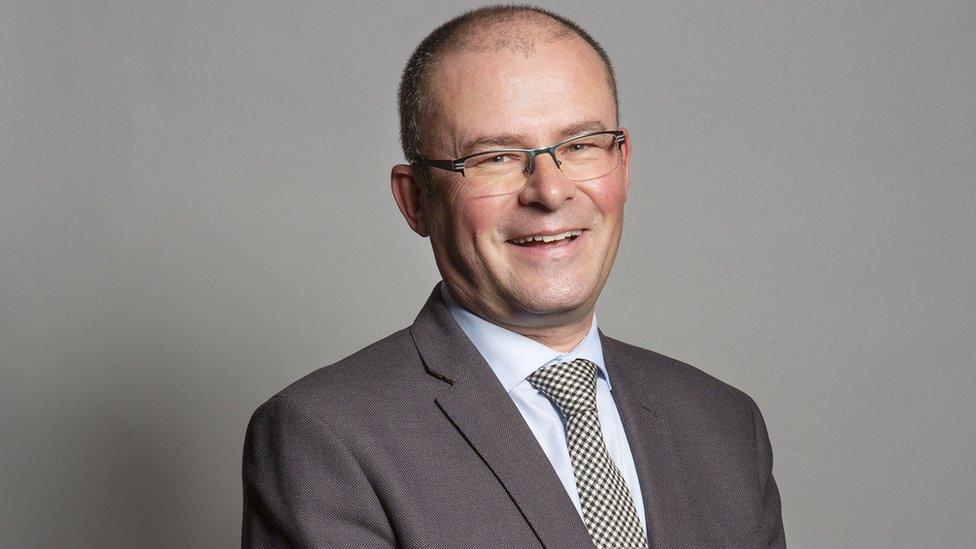
- Published15 December 2019

- Published13 December 2019
